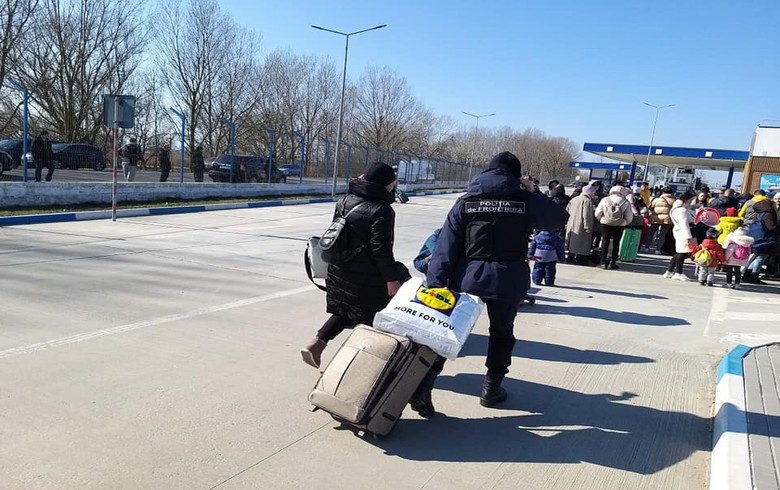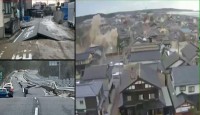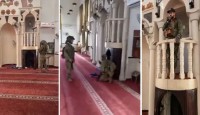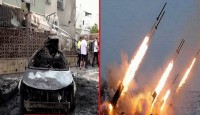After four days on the road, sleeping in her car, Ludmila Lyskevska was in a defiant mood. “Putin has gone bonkers. He wants Ukraine to be part of his imperium,” she said, stretching her legs as snow fell from a white sky. “He’s managed to unite the whole country against him.”
Lyskevska was travelling in a three-car family convoy. The group was part of a vast caravan of vehicles waiting to leave war-stricken Ukraine and cross the border into Poland. Over the course of a 20-minute conversation, her group advanced a mere 100 metres. They had been queueing for 20 hours. Behind her, more cars arrived. A pensioner, she set off on Friday from the southern city of Zaporizhia on the Dnipro river.
Why did they escape? “The Russians were closing in. They seized our nuclear power plant,” she said. “We feared an explosion.” She left with her daughter, son-in-law, three grandkids and a dog, now being walked on the grass next to a petrol station. Across Ukraine, millions of people are similarly on the move. As of Sunday night more than 1.7 million people have fled abroad, with 1 million crossing into Poland, according to the UN.
Others had exited western Ukraine for Slovakia, Hungary, Moldova and Romania. It is Europe’s biggest refugee crisis since the second world war. And it is only just beginning. Ukraine’s president, Volodymyr Zelenskiy, has banned men aged 18-60 from leaving the country. More than 60,000 Ukrainian expats have returned home since Russia’s invasion in order to fight.
A few men waiting in the queue at the Ukrainian border town of Krakovets said they would drop their families off in Poland before returning home to take up arms. Many of those fleeing had friends and family in enemy Russia. Lyskevska said she had quarrelled with her sister who lives in St Petersburg with her Russian husband. “I rang them up. He told me the Kremlin was only bombing military infrastructure.
I asked him to stop watching Russian state TV and said: ‘Our people are dying.’ He doesn’t believe me.” “Putin’s soldiers are killing civilians and shelling cities. They destroy everything. Look at Mariupol,” Lyskevska’s daughter Lena said. During their epic road trip, the family saw a rocket attack when they had parked up for the night.
“We heard the explosions. Seven of them. It was terrible,” she said. The route to the border follows Ukraine’s M10 highway. It passes the western city of Lviv and goes through a long stretch of thick pine forest. Along the way are several new checkpoints manned by soldiers and local militia wearing hi-vis jackets. There are sandbags, green camouflage nets, machine-gun posts and piles of logs neatly stacked next to braziers. War feels everywhere.
There is also a sense that today’s bitter conflict between Kyiv and Moscow blends with previous historic struggles. Blue and yellow flags fly next to the red and black flag of the Ukrainian insurgent army, which fought against the Red army during the second world war. Roadside billboards read: “It’s our home. We will bury you here” and “Fuck off, Russian warship”, a popular meme.
The 12km queue begins on a desolate stretch of road surrounded by yellow scrub and fir trees. Many cars have signs on the windscreen with the word “Deti” – children – in Russian. On Monday the queue was 1,300 vehicles long, plus 500 pedestrians. Some mothers emerged from taxis, and walked the last few kilometres, dragging along children and suitcases.
“After seven days sleeping in a Kyiv metro station, we decided to get out,” Marina Pavlova said, explaining that her 13-year-old son, Matvey, had medical issues. She added: “We are Russian speakers. We don’t need Putin to ‘save us’. We have friends like us from Kharkiv. They have vowed to only speak Ukrainian from now on because of what he has done.”
Galina Padalko, a communications manager, said she and her husband, Dmytro, left Kharkiv over the weekend, after days of bombardment that saw their flat tremble. A Grad missile landed nearby last Tuesday, blowing the leg off and killing a woman who was out buying supplies. “A couple of rockets fell not far from us. We couldn’t stand it, so we decided to evacuate,”
Padalko said. They walked for an hour and half to the train station, stood in a line for eight hours in -3C, and got on a train heading west. Padalko shared a video showing desperate passengers clambering over the rails in darkness before standing in packed carriages. “We travelled for 26 hours in an old electric train to western Ukraine. As we left, the Russian army shot at us,” she said.
Stas Mykailov said he and his wife, Daria, decided to flee after a bomb landed close to their kids’ school, in Kharkiv’s Severna Saltivka district. “I’m an engineer. I left my flat, car, job, everything. It’s gone.” The family left by train and travelled for 18 hours. “It was very hard. Some people hadn’t brought enough water. Volunteers gave us water and apples,” he said.
Mykailov said Russia was to blame for the conflict and could go “fuck itself”. “The situation is shit. I have Russian relatives. They don’t understand what’s going on here. A friend of mine called his mum in St Petersburg and she told him he was making a fuss. He shouted at her. He said he wouldn’t talk to her again until she had burned her Russian passport.”
After arranging a lift to safety for his wife and two small children, Mykailov returned to the city of Lviv, 62km from the Polish border. He checked on their progress via an app on the Telegram platform that gives real-time updates. It took them 27 hours to cross, he said. “They made it an hour ago. They were four women and three kids in a car. They will go to a hotel and sleep.”
He added: “At first the Polish border guard didn’t want to let them cross because the car has only five seats. Fortunately, she was a woman and she relented.” Mykailov said since they escaped from Kharkiv, a rocket had buried itself on the roof of his apartment block. “I’m on the 11th floor. It seems we have a flat without windows.
The building now has a hole,” he said. Amid this biblical exodus, few refugees had given much thought as to what they might do in Poland. Nobody knew on Monday how long exile might last or whether Ukraine would exist as a sovereign entity by the time they returned.
Many expressed support for President Zelenskiy. He has refused US offers of evacuation and has remained in Kyiv, despite great personal risk. Lyskevska’s grandson Dmitriy Hoholenko, who is 16, said he hoped to continue studying in Poland.
The war had stopped his education. He and his classmates were too young to fight. They were patriots, he said. “I hope to find a Ukrainian school somewhere in Poland,” he added in English. And long-term? “I want to be a graphic designer,” he replied.









মন্তব্যসমূহ (০) কমেন্ট করতে ক্লিক করুন